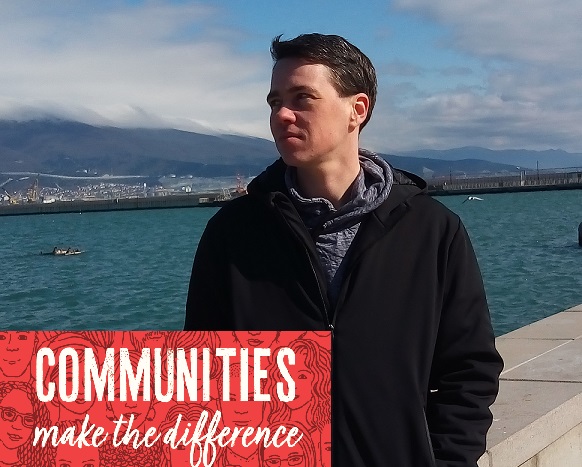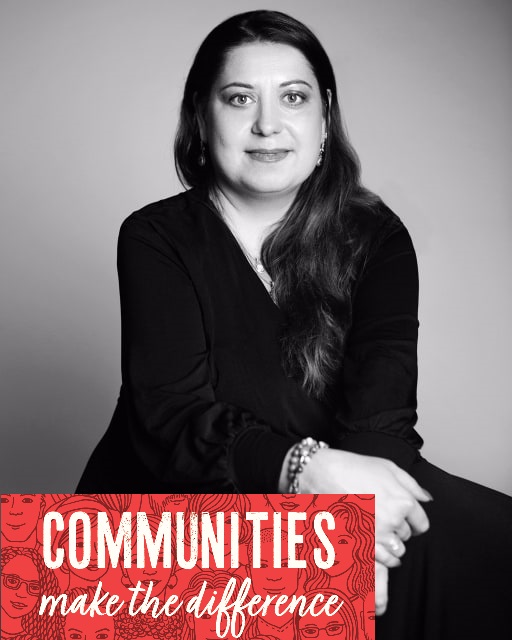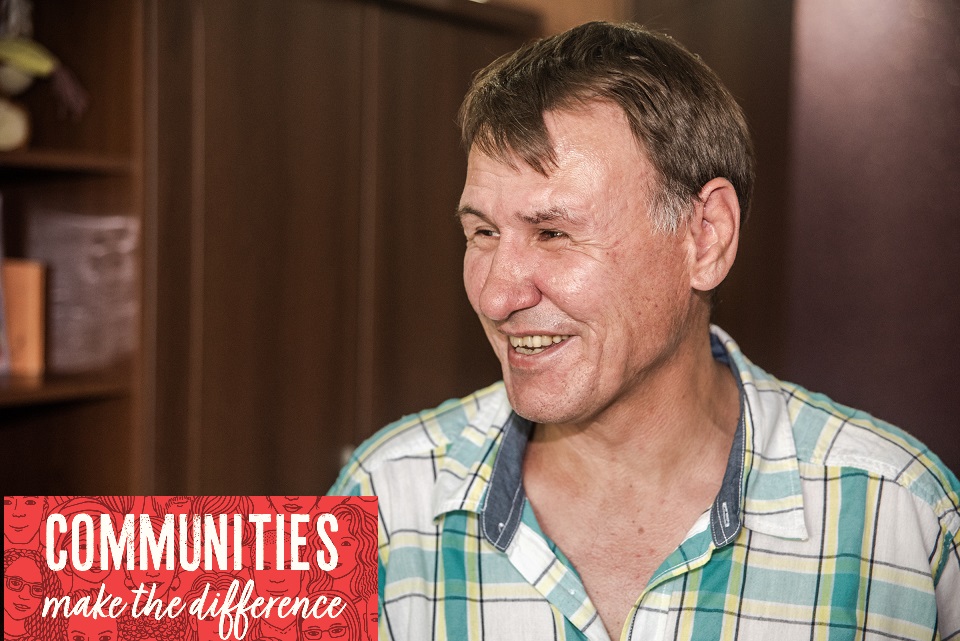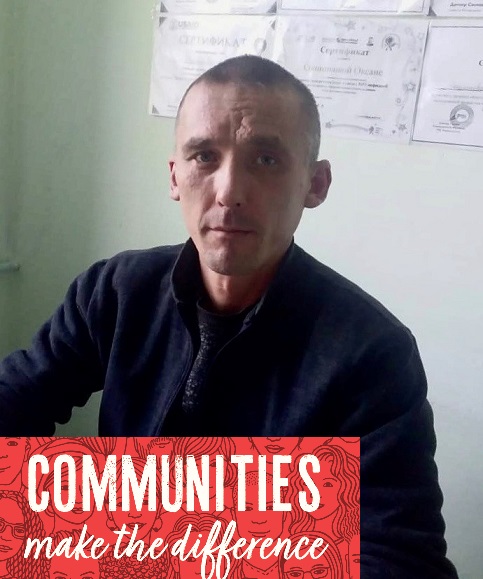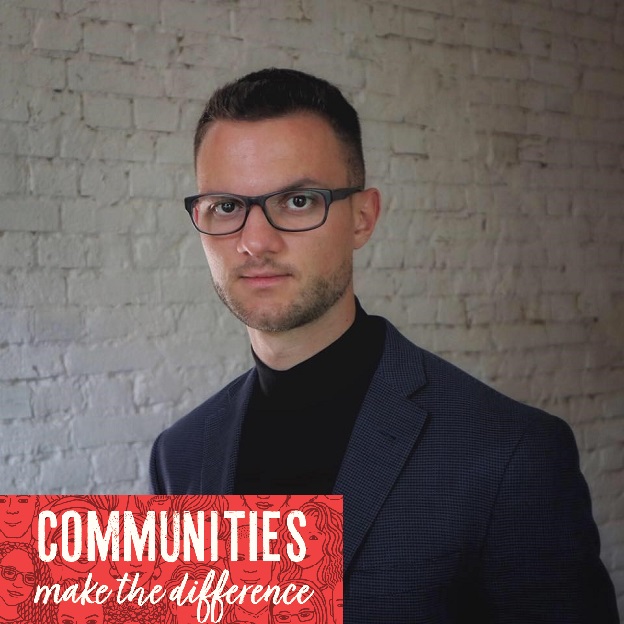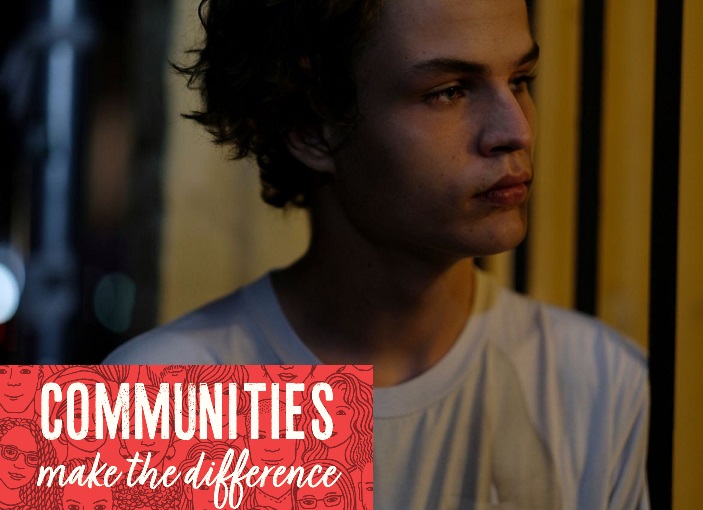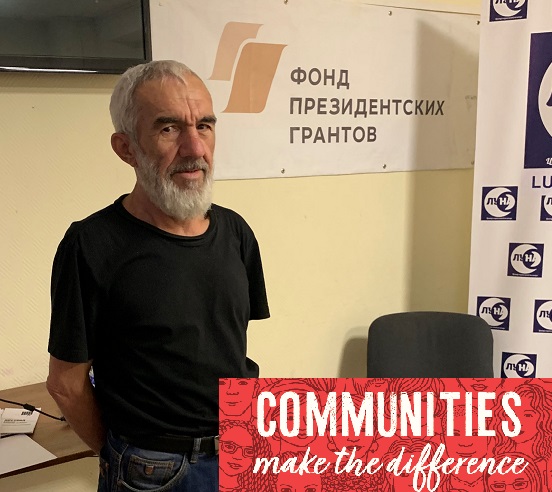The theme of the World AIDS Day 2019 is communities. Сommunities that make an invaluable contribution to the AIDS response. Communities of people living with HIV, key populations such as gay men and other men who have sex with men, people who use drugs, sex workers, transgender people, prisoners, and communities of women and young people are all encouraging and supporting the provision of HIV-related services. Communities are a source of vital energy for an effective AIDS response and an important pillar of that response.
Representatives of these communities are very different. Some of them are already on the front line, defending their rights every day, others are just beginning their journey towards important changes – for themselves and for society. On the World AIDS day AFEW International talked to them about their experiences and goals.
Konstantin Bushuyev, trans*activist, Russia
About the difficulties
At some point in my work on HIV prevention among transgender people, I was faced with some frustration. There were results. But they weren’t exactly the ones I wanted. And this work did not always find support in the trans* community itself. Studies I know from NGOs in Russia show that the topic of HIV for trans*people is not a priority. The first place is occupied by issues with hormone replacement therapy for those who need it, and general difficulties with safe access to qualified medical care. And the research that I took part in at the time showed that people who took part in the survey were very indifferent to the topic of HIV prevention, given their good knowledge of other health issues. For trans*people, in my opinion, the issues of HIV prevention and treatment are most closely related to health issues in general. Trans*people very often do not seek medical help until the last moment. Because they are afraid of inadequate response from doctors, transphobia. Because they are afraid of being outed. Because they are not ready to explain again who they are. And doctors themselves often do not know what to do with such a patient. And when it comes to HIV, all these fears double, because it is an additional stigma.
About success
For me, the main success now is that I have decided not to leave activism, despite the various circumstances that have almost already led to it. Burnout, that’s the thing…
About a reason to be proud
In Krasnodar, HIV prevention activities have been carried out by activists for a long time. But I am proud of the fact that my work helped to drawn attention to transgender people as a separate group with its own peculiarities and needs.
Evgeniya Korotkova, Board Member, Eurasian Women’s AIDS Network, HIV+, Uzbekistan
About gratitude
I am happy to be able to speak openly about my status because I feel the great support of my family, colleagues, activists, friends and women who have experienced HIV infection. After all, each of them has invested something so that I can now talk about HIV infection without fear, without pain or humiliation. Someone can do it right away, others need time.
About open conversation
Sometimes I talk about HIV because I have thousands of people behind me who are living with HIV and they are not ready to speak for themselves because of the stigma and discrimination in society. And for the voice of the community to be heard, you have to talk and sometimes even scream. Sometimes I talk about HIV for the public to break existing stereotypes about people living with HIV and motivate them to take responsibility for their own health and HIV testing. Sometimes I talk about HIV for PLHIV who have learned about their status, I share with them my positive experiences of living with HIV. Given my personal experience of having a child without HIV, I understand that this is a question that concerns every woman living with HIV personally and affects so many areas of a woman’s life, from self-esteem to an external social environment.
I care about women and HIV first because I am a woman, mother and wife who have gone through all the hardships of living with HIV. Secondly, it is important for me to involve women living with HIV in addressing women and HIV. We know our needs and requirements better, and what actions lead to the improvement of their quality of life. Thirdly, by helping to build women’s capacity to advance their rights and improve the national response to the needs of HIV-positive and vulnerable women, we could significantly reduce the spread of HIV among the entire population and increase support for children living with or affected by HIV.
About success
My colleagues and I initiated the submission of documents to the Ministry of Justice in order to obtain the legal status of the women’s organization “Positive Women” in Uzbekistan. I very much hope that in 2020 we will have more opportunities to lobby for the interests of our members at AIDS Centers in the field of expanding access to HIV treatment for women and children, improving the quality of medical services provided to reproductive health and combating violence against women.
Yevgeniy Yuldashev, peer navigator, ex-prisoner, Kyrgyzstan
As an ex-prisoner, I faced different barriers on my way.However, the biggest challenge for me was my release from places of confinement. When I tried to return to the society, the society demonstrated its resistance and did not accept me as a person. It was very important for me to regain self-confidence, overcome self-stigma and learn how to respond to discrimination.
After the release from prison, working in an NGO is the best option. Here people are more open and treat you like a normal person, which is a rare case in government institutions, for example. An important part of my way was my work, thanks to which I was able to help people from key populations and heal myself.
About a reason to be proud
Most of all I am proud of the fact that now I really start seeing myself as part of the society as I have completely quit injecting drugs and methadone. I am proud that I am married and can work in an NGO. A big achievement personally for me is having the freedom to openly say that I have seven records of criminal conviction, went to penal colonies four times and spent 12 years in places of confinement.
Besides, I am very happy that now government bodies start working on creating better conditions for people who are released from places of confinement. To a great extent, it is due to the fact that our community not only continues its fruitful work with civil society organizations, but also starts interacting with government agencies and probation departments.
Ildar Guzairov, Director of Karina NGO, HIV+, Kazakhstan
About the challenge
The biggest challenge in my life was to accept my status. Till the last moment, I did not believe that it could happen to me. Only when I found myself in a hospital and almost lost one of my eyes, I finally believed that HIV exists. At that moment, I was aware that there is life-long therapy, I read a lot about it, even though I rejected my status.
About stigma
This year, I had some difficulties overcoming stigma in places of confinement, when I was arrested and convicted with no reason. First, I couldn’t explain to the policemen that I am sick and that I need treatment and ART. Then, when I managed to explain it to them, I was labelled as “AIDSy”, “black death”, “syph”, etc. I faced all kinds of psychological pressure, including people telling me that I was going to die. It lasted for about three months.
About how to cope
Information helped me to cope with my disease. I was able to show that I was not dying, vice versa I was feeling well and had good health, better than some others! Later I was even called in for questioning, where I was asked about HIV, routes of transmission, if it can be transmitted through air or hand-shaking, how it is treated, etc. Thus I could show that people living with HIV have strong spirit and are almost undefeatable. People shouldn’t play blame games with us as it can happen to anybody. In four months, all my charges were dropped and I was released from prison.
About a reason to be proud
Most of all, I am proud that our community has knowledge and many of us can protect our legal interests at the government level. I am happy that more and more PLWH adhere to treatment and that the government tries to help us. We have a law on HIV/AIDS, a law on probation. People in places of confinement have uninterrupted access to ART, though just last year detention centres could ignore the needs of PLWH.
About achievements
My peers and I organize self-help groups again. Before, we used to get together at my place, up to five people at a time, and today we have 35 or more people attending our groups. My activities really changed the world, the world inside me. Now I understand people, not only from the community, but also others, much better. Once I changed the world inside me, the outside world also changed its attitude to me and now it treats me better!
Andrey Radetskiy, LGBT activist and HIV expert, Ukraine
About the challenge
Probably the biggest challenge for me is that now it is not safe to have sex in Kyiv if you do not have a regular sexual partner. After PrEP became available, we see more sexual freedom, more ways to experiment in our community. That is why many of my friends and acquaintances started using drugs and engaging in chemsex. Back in the middle of 2017, it was difficult for us to find respondents for our first pilot chemsex study in Kyiv, but now finding respondents is not a problem anymore. If I say that every second person could take part is such study, it would not be an exaggeration. Now it is super easy to get an STI in our city, though there are still some problems with the treatment. For instance, to treat syphilis, apart from the standard antibiotic, one needs a couple of other medicines, which are hard to find at the Ukrainian pharmaceutical market as such medicines are mostly produced in Russia. Earlier, we used to have outbreaks of syphilis in spring, but now they happen all the time. Many guys do not notice any symptoms and engage in self-therapy – either as they are afraid of stigma from the side of doctors or as they do not realize how serious the consequences may be.
About activism
In the recent year, I delivered many lectures on sexual education and health in Kyiv-based universities for the students studying PR, marketing, journalism, medicine, psychology and social work.
Currently, I continue holding workshops, presentations, training for MSM, trans people, sex activists and all those interested in HIV/STIs. My training events are popular and demonstrate positive changes in public opinion on LGBT, in particular through raising people’s awareness on HIV/STIs.
Before July 2019, I was coordinating the project of the national information platform for MSM called GET TEST (ALLIANCE.GLOBAL NGO).
Thanks to a number of successful information campaigns, GET TEST became one of the main information portals on health for MSM in Ukraine with a possibility of fast online registration for testing and access to prevention services in 17 regions of Ukraine.
I think I can be proud of our successful information campaign “HIV Test is Easy”, for which we engaged some celebrities, opinion leaders and bloggers. We made a number of social videos, which have tens of thousands of views and receive positive feedback.
They were presented during a morning show at UA:PBC channel on the eve of the World AIDS Day. It was the first time for ALLIANCE.GLOBAL when a project aimed at MSM was publicly presented on TV.
At the same time, I think that my biggest personal achievement this year is that I started working in one of the most famous HIV/AIDS organizations in Ukraine – Elena Pinchuk Foundation, where I manage and coordinate the activities of our education centre – dialogue hub – organizing the work of its residents, developing sex education programs for youth and implementing a number of projects to increase the visibility of LGBT community (exhibitions of LGBT painters, social bullying theatres, Gender Studies talk show, etc.). Besides, in the hub I continue delivering lectures on how to reduce the risks related to chemsex and how to prevent STIs. In particular, I inform and consult MSM community members on PrEP. These lectures are attended by the representatives of our target groups, for whom such topics are most relevant.
About a reason to be proud
For the first time, LGBT agenda was brought up publicly in the Elena Pinchuk Foundation. Before, this organization did not work with this target group. For instance, in October I organized the Gender Studies talk show, with a famous TV host publicly interviewing a transgender woman, Anastasia Eva Domani. The audience of the dialogue hub was positively interested in the talk show.
However, the most significant achievement for the community of PLWH in Ukraine was cancellation of p. 3 of the Order of the Ministry of Health dated 2008, based on which people affected with HIV (B20-B24) did not have the right to adopt or take custody of children. It became possible thanks to the lawyer Vitaliy Matveyev, whom I provided with my expert support. Together we registered the PROJECTOR NGO, which will engage in human rights, advocacy and research activities. Besides, I have been consulting Vitaliy on dealing with the criminal cases against the members of key populations in terms of HIV/AIDS as well as LGBT. Currently, the lawyer makes preparations to defend clients who faced discrimination on the grounds of their sexual orientation or against whom hate crimes were committed.
The activities of PROJECTOR NGO will also be focused on organizing research studies aimed at analysing the behaviour patterns of the groups vulnerable to HIV/AIDS.
Konstantin, coach, 17, HIV+, Ukraine
About the challenge
The hardest challenge for me was losing a close friend of mine. I was in a lot of pain, I felt loneliness and I had nothing. But I coped with it. I don’t think that I could do that without the help of a psychologist at school. The specialist helped me to put everything in its place. I am very grateful to him.
About a reason to be proud
Activism has become a part of my life. I am proud of my activity in Teenergizer and everything I have done in such a short time. My role in the organization is to conduct and organize training. I think it’s important to involve new people in health care because many people still live with the notion that HIV is a sentence, that HIV positive person is necessarily a drug user. But if we look at HIV-positive teenagers, mostly we will not see this. But parents of HIV positive young people indeed had such problems.
Rahim, migrant, PWUD, Russia
About the challenge
The main and most difficult challenge for me is drugs. These drugs drag and eat you up, you live in them, breathe them…and there is nothing else around you. I had the strength to run away from them to the other side of the country. I am proud that I had the strength to do so, and I was able to give up my addiction to terrible substances. Now I am happy – I have a sunshine over me, I have home. I found an abandoned house where nobody lived for 5 years, made repairs, and now I have a house in Russia.
About openness
I talk about myself openly so everyone can see how difficult life can be sometimes. I want people who use drugs to be not afraid to talk about themselves. I guess I’m one of the first people in Russia who speaks with an open face about addiction when I’m in it. But I’m not afraid of that. If you don’t say anything, if you keep quiet, nothing will ever change. I live without a passport, without a homeland, without a flag, and I dream of living like a normal person.
About plans
Next year I’m planning to start farming, get chickens, ducks, goats and rams. I want me to have a home, a family, a wife I love. I really want “salts” to disappear from Russia, they kill people.

